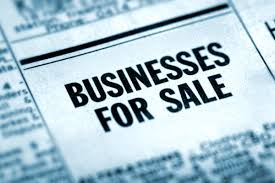Why You Shouldn’t Hire A Real Estate Agent To Sell Your Business
Article by: Chris Griffiths
Special to The Globe and Mail
While I have benefited greatly from the services of real estate agents for the sale of personal and commercial properties, I would never use one to broker the sale of my business. Here’s why and some ideas for alternative approaches.
If you are selling your business and your business includes a real estate asset or assets, by all means, use a real estate agent for those transactions. I have done several real estate transactions over the years and in 100 per cent of the cases, the real agents I dealt with added tremendous value and an obvious return on investment from their commissions and fees.

Most businesses who own real estate acquire those properties under separate holding companies, so it’s easy to treat the sale of the property (retail store, repair shop, manufacturing facility) differently than the sale of the operating company. Many buyers looking to purchase a business may prefer to rent, so even if your operating company owns a property, you may find yourself selling it separately or as an option.
A real estate agent is a valuable contributor, whether it be on a commission basis during a sale offering, or on a fee-for-service basis as a consultant on how to approach the sale or your business property. However, when it comes to preparing a operating business for sale, and managing the transaction process to closing, hiring a real estate agent is not your best approach.
You see, an operating business is far more complex than a structure and land. Your business has many dynamics that influence its performance and valuing your business fairly, for both you and your buyer, is extremely complex – at least when it’s done correctly.
I often look in the real estate sections of my local paper and see businesses listed and wonder how an owner and the real estate agent could attract me to buy. As a buyer, I want to see:
- Detailed income statements, balance sheets and cash flows for the past three years as well as a prospectus on the business that covers the history and the future, including detailed financial projections;
- Non-tangible assets; for example, customer lists and subscription retention rates, and I want to see industry information and a competitive analysis;
- A list of owner benefits; costs that the business absorbs, but benefits the owner on a personal level as well, such as vehicles or other;
- Employee performance histories and compensation levels.
I’d also want to discuss terms, an asset sale versus a share sale, and explore areas where there may be risks for future litigation. I’d want to discuss representations and warranties so I know there is some fall back if it turns out I was sold a lemon through misrepresentations of the facts.
But above all, I want to talk to someone who can answer all the questions above, and more, with confidence. As an owner, you may not be prepared to answer these if you haven’t been coached through the process in advance.
Besides running ads, most real estate agents don’t have the background to help a small business owner prepare all the aforementioned information. The bigger the business, the more important this information becomes. After all, you are not just selling a business, you are selling money – future money. An acquirer will value your business based on the profitability and free cash flow that your business is currently generating and will generate many years into the future. Sure, some small businesses are acquired as “lifestyle” businesses, where high growth and free cash flow are not prioritized as much as a steady income and the involvement in an industry that the buyer may be passionate about – looking for little more than a decent salary. Control over his or her own destiny and some fun may be what some buyers are after.
This is why you need to hire a business broker. He or she can help you position your business for all different types of buyers. Whether on commission or fee-for-service, business brokers can identify these and other ways that you need to prepare your business for sale.
While the broker may guide you, you should want to play a proactive role in the creation of your prospectus — a detailed document, like a business plan, that outlines all key aspects of the business. After all the years you’ve spent selling on behalf of your business, this may be the most important sale of your life and only you can portray all the value your business can bring to a new owner.
With the guidance of a business broker, you will be challenged to take nothing for granted and look at business value from many, many angles that may not be top of mind for you. A business broker will help position the business for sale and help negotiate the terms – which can get complicated with earn outs, escrows, hold backs and owner financing options.
So don’t let what may be the biggest transaction of your life turn into something you think will be “obvious” to a new owner based on an ad in the paper. Do your homework and ask for help from experts so you maximize your sale and have no regrets.
Contact us today to discuss your needs in selling your business.
Info@performancebb.ca 780-756-2990






